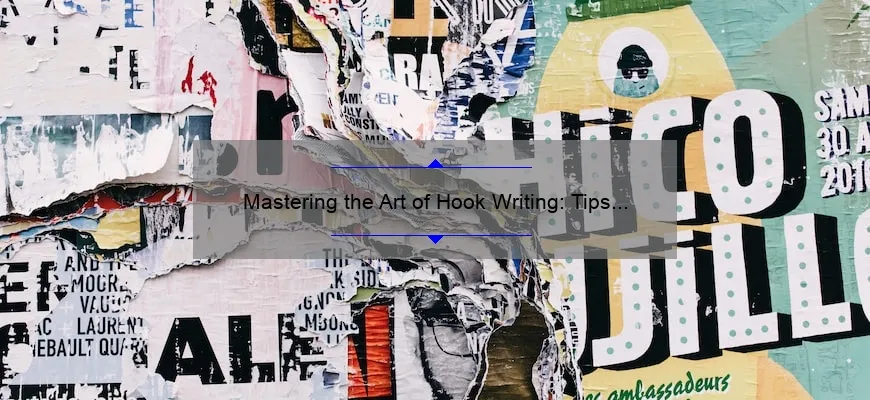Short answer how to write a hook for an analytical essay:
A hook should grab the reader’s attention and introduce the topic of your essay. Use quotes, facts, or anecdotes relevant to your thesis statement that will make your readers want to read more. Be creative but concise.
Step-by-Step Guide on How to Craft the Perfect Hook for Your Analytical Essay
Crafting the perfect hook for your analytical essay may seem like a daunting task, but fear not! With this step-by-step guide and some creativity, you’ll be able to craft the perfect hook that will grab your reader’s attention and keep them engaged throughout your entire essay.
Step 1: Identify Your Audience
Before crafting a hook, it is essential to identify your audience. Who are they? What kind of interests do they have? Having an understanding of your audience allows you to create a hook that appeals directly to their interests or emotions.
For example, if you’re writing an analytical essay on climate change aimed at environmental enthusiasts, start with facts on how human activities contribute significantly to global warming. Such information establishes credibility while capturing readers’ interest from an emotional angle by highlighting what we’re doing wrong.
However, suppose you’re addressing academic scholars studying literature in-depth. In that case, opening with quotations from prominent authors relevant to your topic would get them hooked as they seek knowledge-related arguments within the discipline.
Step 2: Choose The Best Type Of Hook For Your Essay
Once you’ve identified who your audience is going to be; it’s time to figure out which style of hooks suit best for engaging them. There are various types of hooks one could employ such as anecdotes or statistics related speculations depending on specifics like:
– Quotations – This type of hook brings insights into famous people and inspires discussion among learners in search of answers.
– Rhetorical questions – These hooks can provoke critical thought in readers and stir up anticipation regarding the exact answer writers offer.
– Anecdotes – A well-told story is relatable & appears less formal than explaining something abstractly straight-up blunt text does
– Shocking Statements – Startling details regarding research findings or opinions when presented logically are another form creating curiosity gaps where learners want more answers yet engage fully due sheer interestingness hence requires persuasive tone
It’s important to select a hook that aligns with your audience expectations and the topic at hand. For example, saving dramatic stories for persuasive topics would work well while quotes resonate best in historical essays.
Step 3: Begin With A Strong Opening Line
The first sentence of your essay sets the tone for what is to come. Therefore it should capture readers’ attention by evoking emotions or interest.
Bear in mind that you might only have a few seconds at most to get your reader hooked! An excellent way to do this is through establishing credibility and relevance right away subtly yet compellingly throughout an introduction paragraph via figurative language devices like metaphors similes etc.
For instance, suppose we take climate change once more as our focus area. In that case, one could opt for shocking statements such as “Imagine having just 9 years before witnessing catastrophic effects due climatic instability” Based on available data hence presenting urgency & importance concurrent readership’s awareness level.
Conversely, academic scholars may look up literature materials online but laziness comes into play when nothing seems engaging enough thus starting on clever opening lines so they won’t falter away mid-reading instead absorb knowledge taken from their discipline expertise.
In conclusion,
Crafting the perfect hook can seem daunting initially; however, following these three steps – identifying your audience type,m selecting suitable hooks based on research findings + effective formatting ,& strong opener made memorable – will result in something captivating. Remember though whatever approach/ strategy applied ought complement both target readers alongside discussion point across effectively engross them within personalized reading experience leading fruitful conclusions overall rendering own work creating lasting impact amongst them over time too!
FAQs on Writing Hooks for Analytical Essays: The Expert Answers You Need
When it comes to writing an analytical essay, the importance of a good hook cannot be overstated. The introduction sets the tone for your entire piece and helps capture the attention of your reader. However, crafting a successful hook can be a challenge even for seasoned writers. In this article, we’ve compiled some expert answers to common FAQs on writing hooks for analytical essays.
1) What is a Hook?
A hook is an opening sentence or paragraph that captures your reader’s attention and encourages them to keep reading. It can take many different forms including questions, quotes, anecdotes or statistics.
2) Why Is A Hook Important For Analytical Essays?
The hook serves as the first impression that readers have of your essay; if it’s weak they’re likely to lose interest fast! Because analytical essays often deal with complex topics such as science, history or literature among others, having a strong initial impression makes all the difference in increasing engagement throughout the entire text.
3) What Makes An Excellent Hook?
An excellent hook should:
* Be Relevant: Your topic should dictate how you start your paper—your words must interest and connect directly with what follows next.
* Be Specific: Rather than making generalizations about something broad like citing Plato gives more weight compared to saying Philosophy books
* Be Interesting & Catchy: unique phrasing combined with creative story-telling presents high chances of creating memorable tokens which stick out into readers minds long after finishing their read.
4) How Do I Choose The Best Type Of Hook To Use In My Essay?
To pick out what kind of hook will work best depends on:
– Your personal style
– Complexity level of assignment
– Tone/attitude conveyed in overall messaging
– Target audience preferences
5) Can I use humor in my hooks?
Absolutely! Funny tones add life into otherwise static pieces drawing one closer
6 )How Long Should Hooks Be In Analytical Essays?
Most hooks usually range between one to two sentences in their length, but some can take up an entire introductory paragraph. It’s important not to overdo it though – the goal is capture readers’ attention, not overwhelm them with too much information!
7) Do I Need To Craft A New Hook For Each Paragraph Of My Essay?
No necessarily. One strong hook for the essay’s introduction sets tone and lets skillful writing continue through entire text . However changing up types of hooks used throughout body paragraphs keeps pieces varied bringing new life into analysis.
In conclusion, a great hook doesn’t have to be complicated or lengthy—it just needs to grab your reader’s attention and provide a glimpse into what they can expect from the rest of your work.Once you hone in on how to create ideal opening statements meeting qualifications targeting specific goals desired by analytical essays used; swift yet thorough writing will follow suit. If still experiencing hardships applying tactics listed don’t hesitate seeking professional help getting expert opinions upon final product then setting things appropriately check fantastic feedback pile high!
Therefore practice makes perfect & give time which goes hand-in-hand till brilliant results are reached.
Happy Writing!
Top 5 Facts About Writing Hooks for Analytical Essays You Didn’t Know
If you have ever written an analytical essay, you know that the opening sentence can make or break your piece. It’s the hook of your paper — the part that grabs your reader’s attention and motivates them to continue reading. Without a great hook, even the most well-structured essay may fall flat.
So what makes a great hook? In this blog post, we will explore some little-known facts about writing hooks for analytical essays that might surprise you.
1. A strong hook sets up expectations
A good introduction is like an overture to a symphony; it should set up expectations for what is to follow while drawing in the listener’s attention with its own musical merit. Similarly, a strong hook engages readers by laying out exactly what they can expect from the rest of your essay.
For example, if your analytical essay will be discussing Shakespeare’s Romeo and Juliet through the lens of feminist theory, then craft a first sentence or paragraph that frames this idea clearly upfront: “In examining Shakespeare’s timeless tale of love and tragedy today through a modern feminist perspective,” etcetera…
2. Hooks don’t always have to be sentences
While many assume hooks must be entire sentences at all times, sometimes using just one word could prove effective – after all brevity is often appreciated when grabbing someone’s full focus quickly too! If choosing this approach think carefully though as this technique needs careful placement so not diluting power subsequent content sections!
3. Immerse Your Reader into Facts That Normally Aren’t Associated with The Topic
Another nifty trick would engage unusual elements related but so different topic-wise – done right such injection mysteries curiosity opens doors emotionally enticing exploration without making audiences overwhelmed by shifting tones abruptly from common subject-matter vibe normally delivers straight-up truths… So long as you’re tying everything back eventually!
4. Quotations Can Jazz Up Your Extrapolation Game Too
Sometimes adding wordsmithing skill beyond own repertoire is always appreciated and shows intellectual depth of research. Plus, quoting experts in a relevant field really boosts your credibility!
5. Don’t Make Your Hook All About You
The purpose of the opening sentence or paragraph shouldn’t be occupied solely by providing context to your writing process – relate chosen theme directly addressed subject matter! Good hooks are attention-grabbing but non-self-indulgent.
In conclusion, hooks set the tone for analytical essay pieces so thoroughly consider proportionate effort invested upfront to polish these little gems, making sure they’re ripe enough entice reader’s curiosity sustain momentum throughout full length works – and experiment with different techniques like quips trivia quotes to fully flesh out wity hook versions worthy professional confidence propel possibility truly enriching worthwhile text experiences!

